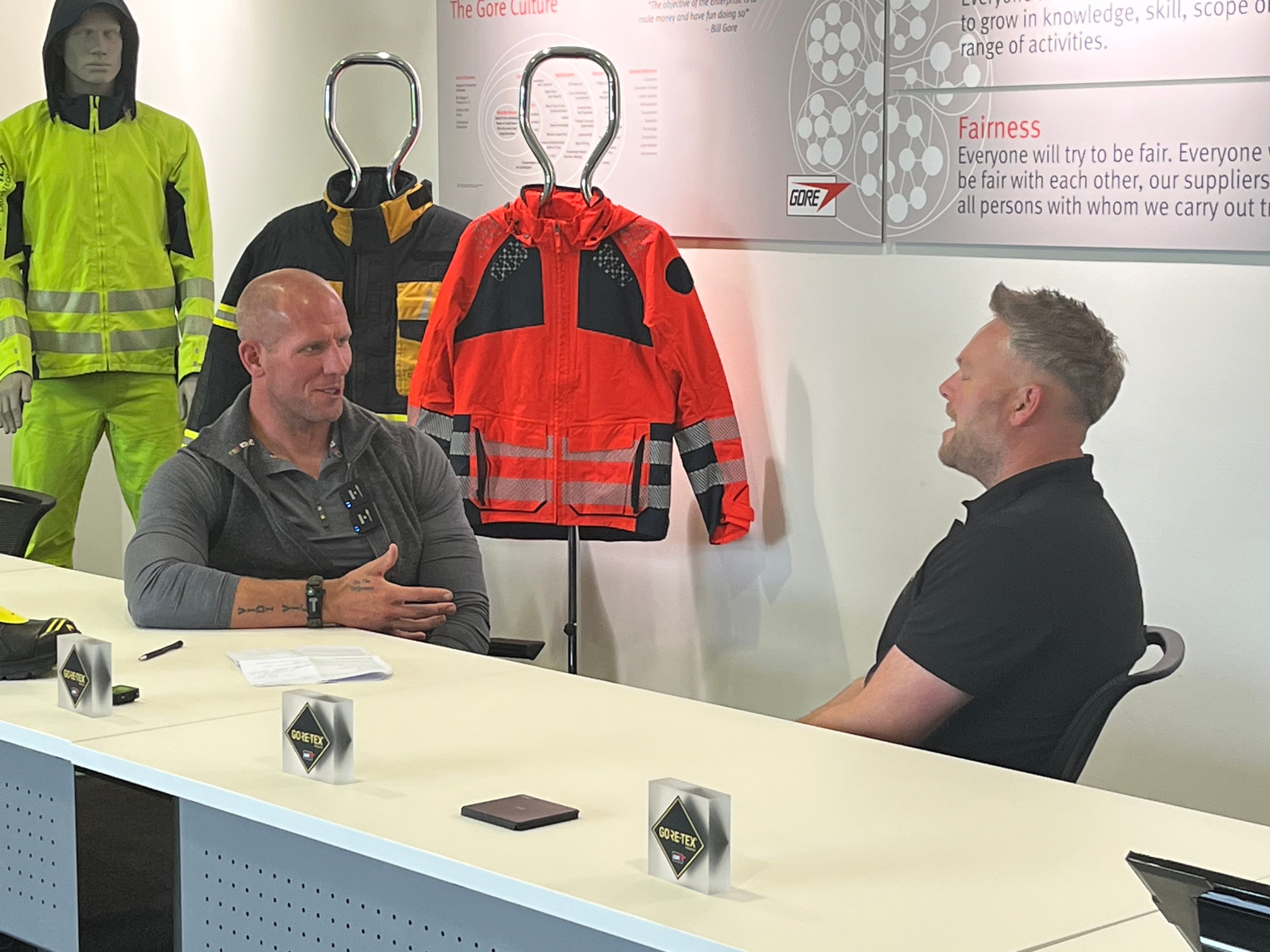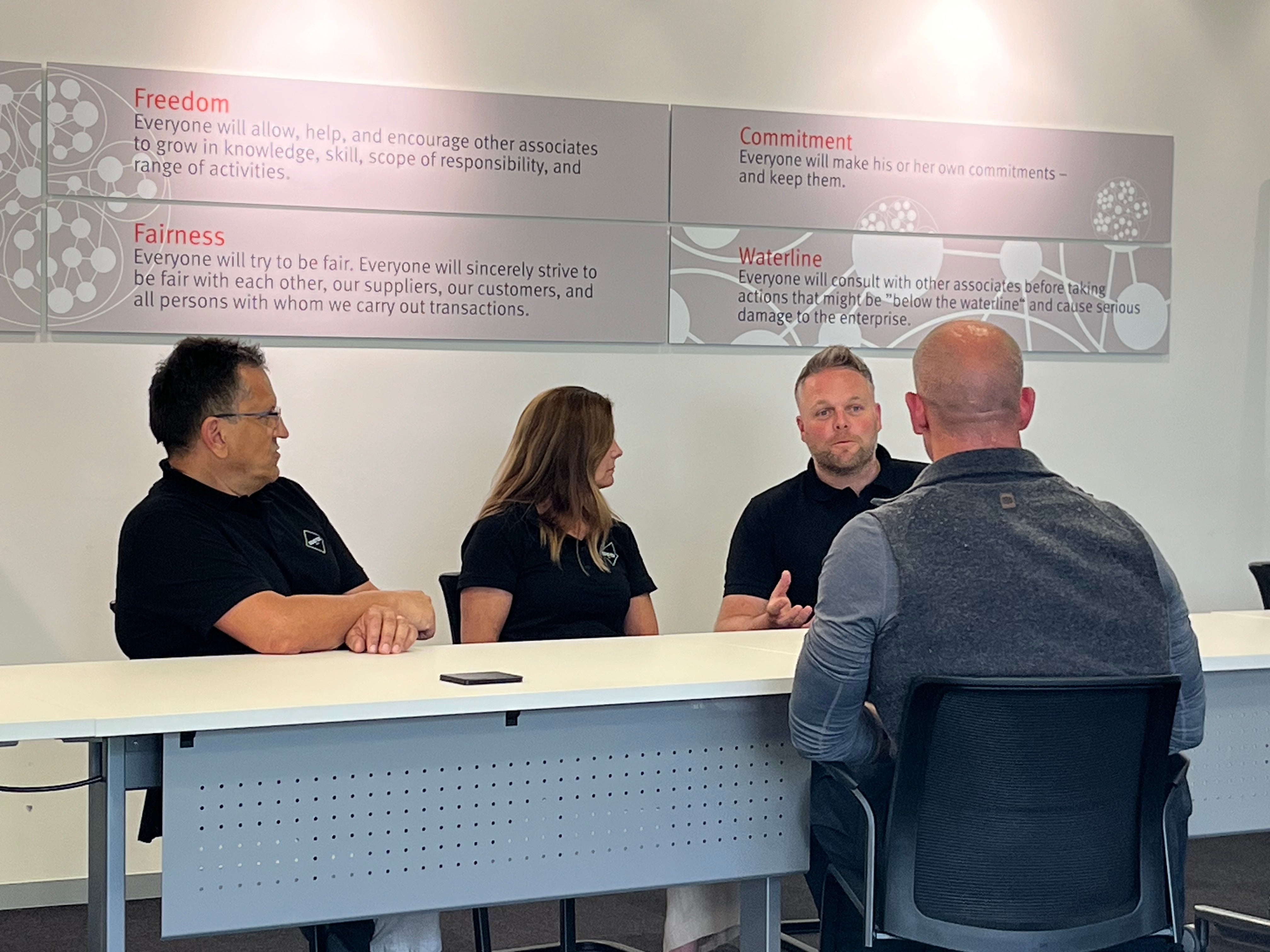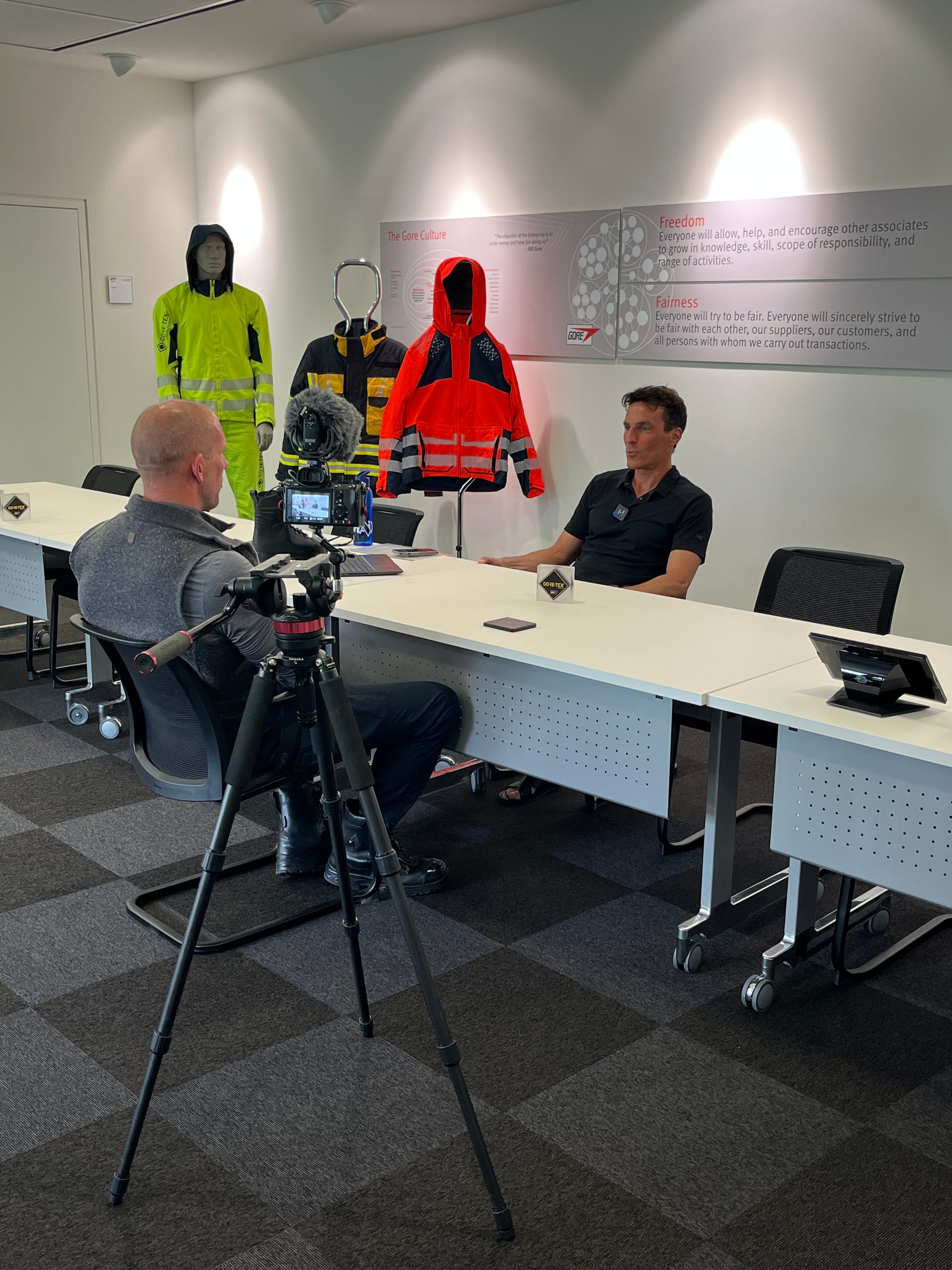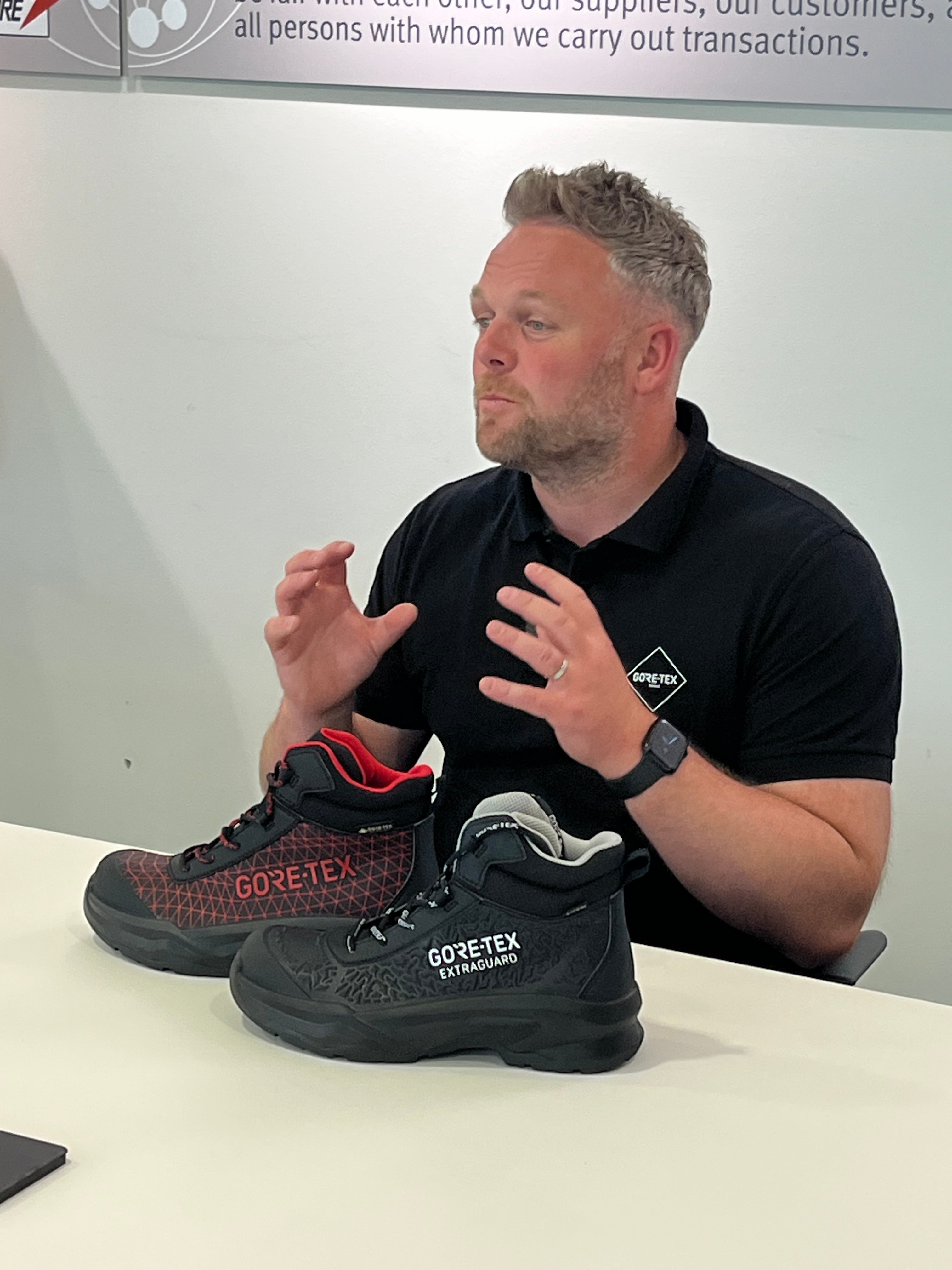My experience when visiting a gore plant - Pete wakefield
Hey everyone and welcome back to The Firefighter's Podcast, where we seek to develop, inspire, and motivate the world of emergency services operator through a series of wide-ranging conversations. Now before we go any further just hit that rate, follow or subscribe button on whatever platform you're listening to. It's a key performance indicator for us and helps us reach even more people. Here's what we've got for you today.
The title for this piece is going to be built around the rediscovery of commitment and the principle of the waterline. It was an incredible privilege to be invited to Gore. I've got to meet so many members of the team, I got to see the factories, I got to see the manufacturing process, I got to see first-hand the authenticity "that we do what we say", in several points during the visits. I found myself thinking of and at times articulating the principle of Ronseal, which is the UK product and effectively says that 'it does what it says on the tin'. That really is exactly what I saw during my time ago. One of the most impressive, but almost unspoken aspects that I really found interesting during my visit, was the fact that associates and team members didn't appear to need any motivation. They didn't need to be pushed. There's no assertiveness put upon them by other colleagues. There was instead, a really strong and consistent feeling of commitment. How Gore articulates and lives this aspect of commitment is really refreshing and almost makes me feel quite romantic, about how I like to live my life and how I like to hold myself accountable to other people, and that is what I mean by that, is that when you're in Gore and you say you commit to something, that's all that needs to be said. I'm very lucky to be invited to a lot of organizations and in total honesty, when I visit a lot of other organizations, it's a common part of the vernacular that "we are overworked", "under resourced", "pushing hard", "missing deadlines", trying to catch up, and there's almost a steady back track of "so and so's" behind. "We were supposed to have this thing done but so and so didn't get back to me", "so and so can't make it today". Not once did I experience any of that at Gore and that's not because it's militaristic or dictatorship or anything like that. It's more that people have a very apparent set of personal values. They give them an incredible amount of self-motivation, they're self-disciplined, they're driven to deliver and do the thing that they say they would do, because it aligns with their personal values. Everywhere we went, people were on time or early, people were ready, people brought the things they said they were going to bring. People took me and showed me the thing they said they were going to show me and it was done with a constant calm, consistent sense of purpose. There was no rush, there was no hurried business, there was intentional action. People were where they should be and it brought such an overwhelming and obvious sense of calm
 and purpose to every aspect of the visit and when I pulled a couple of people aside and asked them about what I was observing, there was this constant theme of commitment. And the commitment side of things really heightens as well with the sense of self-awareness, knowing what you are capable of doing and what you're not capable of doing. Knowing what you have the capacity for. In a lot of organizations you tend to see people that over-promise and under-deliver, especially if they're new to the business, they tend to say yes to everything and then go through a period of letting everybody down or overworking or losing that balance. That healthy balance and either their professional or their personal life takes a toll for it. Not once did I observe any of that. People know what they can do and they know what they can't do. They know they've got time for and they know what they've got time to do well, as well which is a very important point to raise., Nothing was half done. Nothing was less than it should be. Everything and everyone was held to a standard, but held to that standard by themselves, which was quite surreal and I think one big part of protecting the culture is this aspect of the waterline. And it also works hand in hand with their ability to protect the product as well.
and purpose to every aspect of the visit and when I pulled a couple of people aside and asked them about what I was observing, there was this constant theme of commitment. And the commitment side of things really heightens as well with the sense of self-awareness, knowing what you are capable of doing and what you're not capable of doing. Knowing what you have the capacity for. In a lot of organizations you tend to see people that over-promise and under-deliver, especially if they're new to the business, they tend to say yes to everything and then go through a period of letting everybody down or overworking or losing that balance. That healthy balance and either their professional or their personal life takes a toll for it. Not once did I observe any of that. People know what they can do and they know what they can't do. They know they've got time for and they know what they've got time to do well, as well which is a very important point to raise., Nothing was half done. Nothing was less than it should be. Everything and everyone was held to a standard, but held to that standard by themselves, which was quite surreal and I think one big part of protecting the culture is this aspect of the waterline. And it also works hand in hand with their ability to protect the product as well.
 One of the key aspects of Gore is that they have come across a material that is so diverse, so flexible in its use, so many tremendous applications, so many phases and stages of innovation and revolution and through what they articulated is this concept of waterline and I am shamelessly going to seal this aspect of the waterline. Because what is says to me, is that in order to protect this incredible culture of this incredible company that's been created, there are people that have a true understanding and appreciation of what decisions have the potential to damage the brand, to damage the culture, and to damage the continued success of the company. And with experimentation comes and element of failure, because that's how we learn. I think when individuals are new to the company, they are given that freedom in that trust but there's an appreciation that it will take a period of calibration for them to really understand how important the values and the core principles of the company are, because a lot of companies have values. A lot of companies have a core code of ethics, they have principles, they have a mission statement they write on the wall, but most people in the companies can't articulate it, can't remember it and often it's meaningless. Whereas in Gore, this aspect of the waterline is given to those who can fully understand and have fully assimilated and live the values of the company. So, when they're trusted to make a decision, if that decision is something that's below the waterline then it has the capacity to sink the ship. I had several people describe their analogy of the waterline, but they all were framed around this concept that we all live in this boat. We're all on this journey together and there's certain decisions that are above the waterline. And if it's above the waterline and it's mishandled or there is a complication or if there's an unanticipated challenge and the decision doesn't go well or we don't get the desired outcome, then the vessel can sustain the damage. The hole that is punctured is above the waterline and together as a team we'll repair it and will carry on. The ship will continue to sail through the storm. But if that decision is one that sites below the waterline, then it's crucial that it's given due consideration and someone with a fully holistic view of the impact of that decision, is interested to make it. Because if a decision that sits below the waterline is not fully considered, then the potential damage that can come from the result of a poorly made decision, below the waterline, has the ability to sink the ship, has the ability to send the entire vessel into panic, will start taking on water. We will make less progress. We will damage things inside the vessel and the worst case scenario: it may sink. And that is such a truly crucial part of sustaining a business and sustaining a culture, allowing someone inside the bowels of that vessel to make decisions and to impact the teams, the product, the end-user, the partners of the company. That is a really, really culturally important part of decision-making. And it's so important to recognize and continually reinforce those
One of the key aspects of Gore is that they have come across a material that is so diverse, so flexible in its use, so many tremendous applications, so many phases and stages of innovation and revolution and through what they articulated is this concept of waterline and I am shamelessly going to seal this aspect of the waterline. Because what is says to me, is that in order to protect this incredible culture of this incredible company that's been created, there are people that have a true understanding and appreciation of what decisions have the potential to damage the brand, to damage the culture, and to damage the continued success of the company. And with experimentation comes and element of failure, because that's how we learn. I think when individuals are new to the company, they are given that freedom in that trust but there's an appreciation that it will take a period of calibration for them to really understand how important the values and the core principles of the company are, because a lot of companies have values. A lot of companies have a core code of ethics, they have principles, they have a mission statement they write on the wall, but most people in the companies can't articulate it, can't remember it and often it's meaningless. Whereas in Gore, this aspect of the waterline is given to those who can fully understand and have fully assimilated and live the values of the company. So, when they're trusted to make a decision, if that decision is something that's below the waterline then it has the capacity to sink the ship. I had several people describe their analogy of the waterline, but they all were framed around this concept that we all live in this boat. We're all on this journey together and there's certain decisions that are above the waterline. And if it's above the waterline and it's mishandled or there is a complication or if there's an unanticipated challenge and the decision doesn't go well or we don't get the desired outcome, then the vessel can sustain the damage. The hole that is punctured is above the waterline and together as a team we'll repair it and will carry on. The ship will continue to sail through the storm. But if that decision is one that sites below the waterline, then it's crucial that it's given due consideration and someone with a fully holistic view of the impact of that decision, is interested to make it. Because if a decision that sits below the waterline is not fully considered, then the potential damage that can come from the result of a poorly made decision, below the waterline, has the ability to sink the ship, has the ability to send the entire vessel into panic, will start taking on water. We will make less progress. We will damage things inside the vessel and the worst case scenario: it may sink. And that is such a truly crucial part of sustaining a business and sustaining a culture, allowing someone inside the bowels of that vessel to make decisions and to impact the teams, the product, the end-user, the partners of the company. That is a really, really culturally important part of decision-making. And it's so important to recognize and continually reinforce those people who stand on guard, at their corners of cultures. There's those cultural architects who make really pivotal decisions that are below the waterline and when I cast my mind into the first responder community it's that aspect of brand new recruits in the fire services, the police, the military, the ambulance, making decisions on the incident ground. Some of which are above the waterline. Some of which will not have a tremendously detrimental effect and the outcome of the incident, if they're not executed proficiently. But some decisions, a strategic decision, a tactical decision: Do we go left or do we go right? Are we offensive or defensive firefighting? Are we going to commit to the building? Am I going to send them to the first floor? They're waterline decisions and if someone doesn't have the requisite experience, knowledge, self-awareness, situational awareness and on the frontline people will die. And it's translated that into a company the death of an organization has the potential to happen if only one or two waterline decisions aren't navigated correctly.
people who stand on guard, at their corners of cultures. There's those cultural architects who make really pivotal decisions that are below the waterline and when I cast my mind into the first responder community it's that aspect of brand new recruits in the fire services, the police, the military, the ambulance, making decisions on the incident ground. Some of which are above the waterline. Some of which will not have a tremendously detrimental effect and the outcome of the incident, if they're not executed proficiently. But some decisions, a strategic decision, a tactical decision: Do we go left or do we go right? Are we offensive or defensive firefighting? Are we going to commit to the building? Am I going to send them to the first floor? They're waterline decisions and if someone doesn't have the requisite experience, knowledge, self-awareness, situational awareness and on the frontline people will die. And it's translated that into a company the death of an organization has the potential to happen if only one or two waterline decisions aren't navigated correctly.
It's funny, when I was traveling back from my time with Gore, I was actually getting to the end of a really favorite book that I've been enjoying called "The Ideal Team Player" by Patrick Lencioni. And within that book, it has the overarching theme of humble, hungry and smile, and these are considered some of the skills for the ideal team player and I know it's easy to connect the dots looking backwards, but this is a template I could easily place over the top of the behaviors that I saw at Gore. Humble most certainly and this maps itself on to that aspect of commitment as well that we spoke about. There's always that constant thought of others. Often more than just yourself the consideration of other people's capacity. There is a tremendous amount of acknowledgement when I was at Gore, as people were introducing to the members of the subject matter experts as you travel around the factory. People doing testing on stitching. People doing testing on breathability. When we went into the rain towers, each individual that I was introduced to, was preceded by acknowledging the efforts they do, the knowledge they have, the contribution that they made to the organization. And also, when they were talking about their partners, this aspect of constant innovation through eliciting constant feedback from the end-user. The desire to get better. The aspect that constantly giving praise to the people in the organization, again to the subject matter experts, to the partners, to the end-user, the ability to take feedback to take criticism to take suggestions or improvements for the product. The aspect of humble was very, very, very clear as I traveled amongst them. And there's no two ways about it. When you look through the timeline of the company, they have most definitely been hungry, they are driven, they are willing to work, they know, I saw the stuff that they're doing with the astronauts and NASA and origins of the PTFE and how it's used in water lines and seals and the applications that I saw with extreme sports and Everest-climbs and athletes and there's just so many places that this product can be used. And the team seems to have like an octopus with their arms. Everyone is driven to maximize the potential of the company and to share its benefits, with as many people in, as many applications as possible. But it never came at the cost of longevity either there's no focus on the short-term and you do see that a lot in organizations. This echoes back to that aspect of commitment. The things are going to be done right, they're going to be done at a sustainable pace, they're going to be checked and re-checked. It's going to be backstops. There's always the willingness to take two steps forward and one step back if we realize that expediting a process is going to come at the cost of the quality. And finally, when I'm thinking about those three: humble, hungry, smart. The smart side of it, is actually probably one of the rarest ones and the one that I really saw, stand out with the Gore team. And we could turn that as professionalism, politeness, emotional intelligence, self-awareness. It's ultimately people's awareness of how their actions and reactions that affect those around them. There's the aspect of impacting tended versus impact felt. Every interaction I had, was done so in a welcoming, professional, gregarious, polite, inclusive manner. I felt like part of the team. I was trusted. I was let behind the curtain. It was transparent. People let me see and ask questions and point and query and it was very surreal. Again, there's a lot of organizations where there's very much places you can't go, where is very much people you can't speak and that's OK and I appreciate that's done for a reason, but Gore had a very different approach. You know I came in, I was treated with respect, I was trusted and they allowed me inside rooms and inside conversations that I was very surprised to be part of. Things about the product. Things about future innovations. Things about future products. Things about the directions of
 the company and I came away from the entire experience, feeling like I was a part of the team, feeling like I wanted to go back for more, feeling like I wanted to be part of that next great adventure. And the fact that so many people were willing to come and sit down with me and talk about the company, talk about the product, talk about their experience, feeling like I was part of the team of Gore, I was inundated with enthusiastic, fun, interesting, passionate, knowledgeable people that wanted to come and talk to me about their experience at Gore. About the projects they've been involved in. About the trust they've been given and there was no script, there was no person sat in the bag, checking what they said and what they didn't say. They was just an overwhelming sense of trust. People could speak freely about their successes and their setbacks, but still with a very realistic understanding of challenges that are being faced in the market, the challenges being faced by first responders, by paramedics, by police, by firefighters, the challenges and the handlers that we come in contact with every day and how the team of Gore is working diligently, creatively to find solutions to these challenges.
the company and I came away from the entire experience, feeling like I was a part of the team, feeling like I wanted to go back for more, feeling like I wanted to be part of that next great adventure. And the fact that so many people were willing to come and sit down with me and talk about the company, talk about the product, talk about their experience, feeling like I was part of the team of Gore, I was inundated with enthusiastic, fun, interesting, passionate, knowledgeable people that wanted to come and talk to me about their experience at Gore. About the projects they've been involved in. About the trust they've been given and there was no script, there was no person sat in the bag, checking what they said and what they didn't say. They was just an overwhelming sense of trust. People could speak freely about their successes and their setbacks, but still with a very realistic understanding of challenges that are being faced in the market, the challenges being faced by first responders, by paramedics, by police, by firefighters, the challenges and the handlers that we come in contact with every day and how the team of Gore is working diligently, creatively to find solutions to these challenges.
In summary, when I was sat on the plane flying back from Munich, I found myself sat listening to an audio book and staring at my boots and thinking about how the small things make a big difference. And so many pairs of clothing and footwear that I own, there is a small tag that says GORE-TEX on it. I think for many years, I may not have even seen that I didn't know what it stood for. I didn't know what it did. I never thought about the team, the dedication, the values, the effort, the passion and the creativity that had gone into what the label stands for and what the label does for me. How it keeps me safe. How it keeps me dry. How it helps capacity, cycling, running, climbing, walking my dogs, riding my horses. I am able to live my life in a more fulfilled way, because of that small label and it left me with a sense of reassurance, it left me with a sense of feeling safe and left me with a sense of feeling looked after by such a small and often unseen thing that makes such a colossal difference to my quality of life every day.
Firefighters' Podcast is put together to develop, inspire and hopefully motivate those individuals who have chosen to serve our communities and be part of the first responder family. It's brought to you by myself, Operational Firefighter, Pete Wakefield. If you have enjoyed today's episode and you want to see the podcast continue, please head over to our Patreon page where you can support the ongoing efforts of the podcast. Please hit that follow, subscribe or rate button on whatever platform you're listening to and please support your emergency services responders and thank you for listening.
Click hear to listen to audio recording of the above Podcast.


